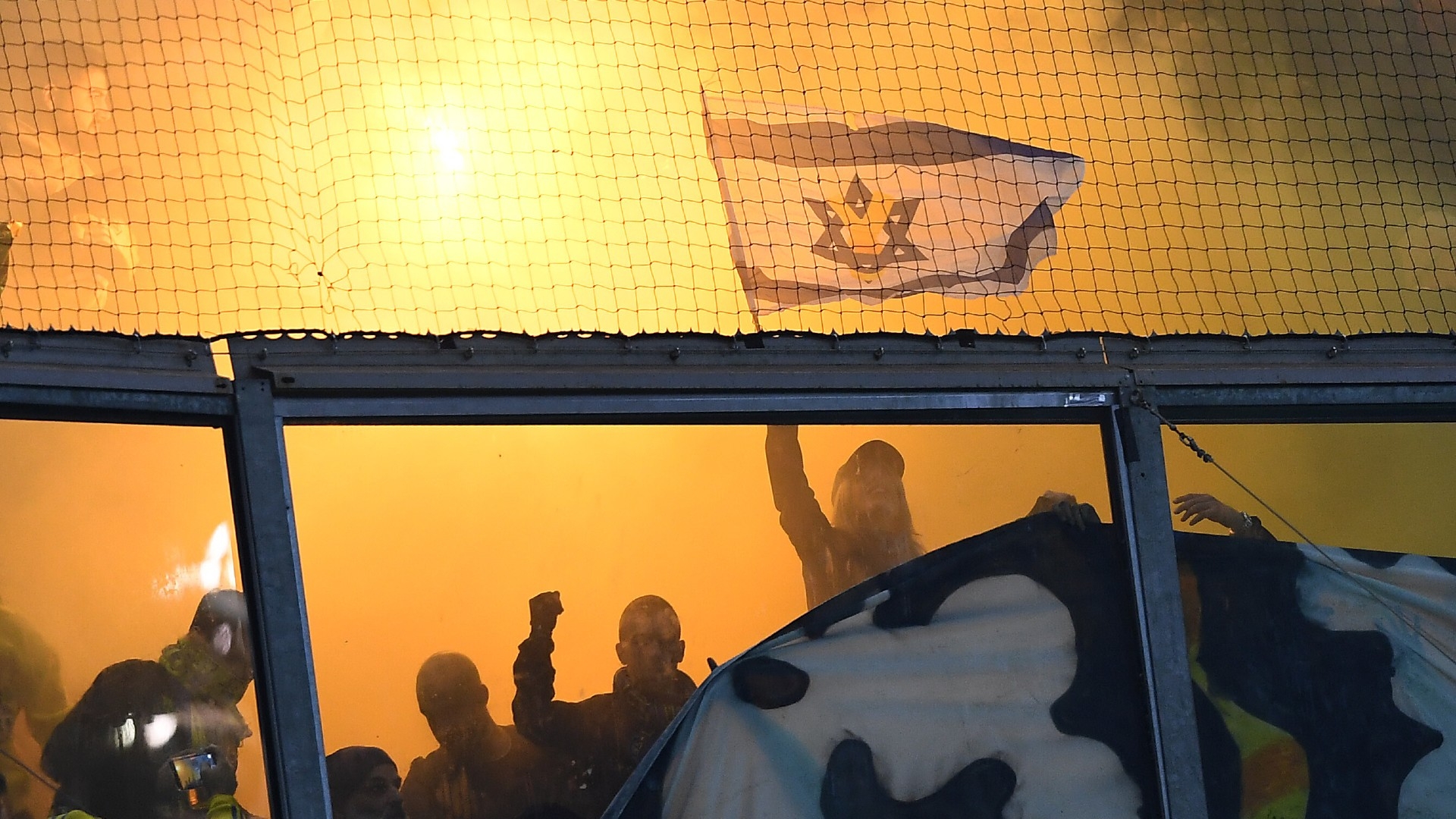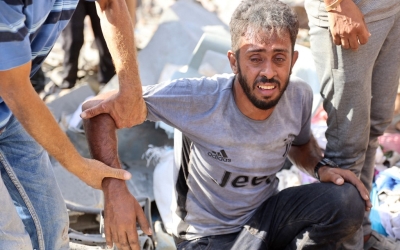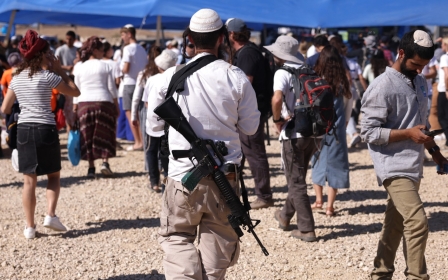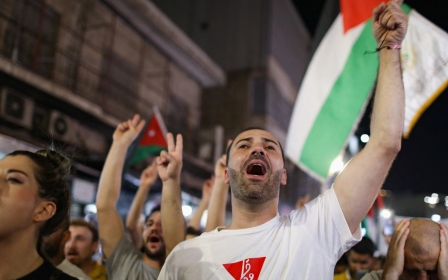Israeli football hooligans bring culture of genocide to Amsterdam

Human history is full of examples of genocidal acts committed by leaders, states, militaries, and armed groups.
But the genocide unfolding before our eyes in Gaza stands out for its level of meticulous documentation and the speed of information flow. Billions of people around the world receive live, uncensored coverage of what is happening in the besieged enclave, from the perspectives of both victim and aggressor.
As we witness the massive scale of destruction and killing, it is essential to note the development of a "culture of genocide" within Israeli society.
One of its most recent manifestations took place on Thursday, when Israeli hooligans, supporters of the Maccabi Tel Aviv football club, provoked clashes with Dutch youth in Amsterdam. They chanted anti-Arab slogans, tore down Palestinian flags, and ignored a minute of silence for the Spanish flood victims.
It apparently never occurred to these Israeli hooligans that racist chanting and acts of vandalism against private property in a foreign country was unacceptable behaviour, which could provoke the anger of local residents.
New MEE newsletter: Jerusalem Dispatch
Sign up to get the latest insights and analysis on Israel-Palestine, alongside Turkey Unpacked and other MEE newsletters
The hooligans' mindset aligns with the genocidal culture that has permeated Israeli society since 7 October 2023, allowing Israelis to imagine themselves as being above the law and morality - not only in Israel, but the world over.
The violent chants of Maccabi fans should be understood within the context of a society that continues to justify Israel's genocidal war against Palestinians in Gaza.
Rising violence
These fans are an expression of a culture that is not just prevalent among a handful of racists; rather, it has become routine in stadiums, with chants of "death to Arabs" or "may your village burn" often heard in Israel long before 7 October 2023.
The behaviour of the Israeli fans in Amsterdam was thus nothing new. A recent report by the New Israel Fund found a significant increase in expressions of violence in football stadiums in the 2023/24 season, with incidents rising by 18 percent - a significant increase over the previous year, which had already seen violence and racism reach a decade-high peak.
The real story here is therefore not the racist chants, but the shock of Israeli fans at the realisation that such behaviour is not tolerated outside their country's borders.
Follow Middle East Eye's live coverage of the Israel-Palestine war
This comes at a time when, for more than a year, cultural codes and rituals have been invoked in Israel to promote and encourage genocide, with limited public criticism. Justifications for the killing of Palestinian children and the starvation of civilians in Gaza have received widespread endorsement.
Last month, Al Jazeera published a documentary focusing on social media posts by Israeli soldiers in Gaza who documented their war crimes in real time.
While much of the world was horrified by this material, Israeli society defended the soldiers and attacked critics for questioning Israel’s right to defend itself. Israeli society is trapped in a state of political dissonance, which limits its ability to understand the logical flaws in such arguments.
To understand how we got here, one must pay attention to the nation’s culture of genocide, which is based on a set of beliefs, morals and customs that encourage, justify and even celebrate soldiers’ actions.
Over the past year, we have been exposed to songs, comedy performances, journalistic broadcasts and cultural displays, along with commentary from religious leaders, football players and academics, that has openly promoted genocide, including the killing of children.
Israeli analysts have not held back on calling for the slaughter of tens of thousands of Palestinians, with some saying the army should be killing more people or removing all humanitarian aid from Gaza.
Instead of condemning and denouncing such statements, academics and commentators have philosophised on how to justify starving a civilian population if it refuses to comply with Israeli military orders.
Thus, beyond the horrifying testimonies emerging from Gaza, we must examine the mechanisms at work within Israeli society. In some ways, we are witnessing a collective psychotic episode, with many apparently unable to feel sympathy or empathy over the suffering of others.
Zero accountability
Even worse, this phenomenon is present everywhere in the public sphere. Walking along Israeli streets, and listening to conversations among people of all ages on trains and in public parks, reveals broad underlying assumptions about the war in Gaza, with a collective cry for more death and destruction.
Lifeguards on beaches in Tel Aviv have publicly cheered the deaths of Hamas and Hezbollah leaders, while members of the public clapped and raised glasses in a celebratory “toast”. Some residents distributed baklava to mark the occasion. To exacerbate the sense of dystopia, this is all happening in a society where many civilians are armed.
Israeli society has thus internalised a sense of impunity, safe in the knowledge that it is above the law, with the world's support
One could argue that Israel’s political and cultural elites are responsible for framing the public mindset, laying the groundwork for this culture of genocide. In addition, the international community has for the better part of a century allowed Israel to act freely, violating international law with zero accountability.
In fact, the world has rewarded Israel for its creativity in developing oppressive mechanisms. Israel’s arms industry has thrived amid the occupation, with Palestinians serving as test subjects.
Israeli universities have grown and flourished, providing infrastructure and research on how to suppress Palestinians, while Arab states have promoted normalisation with Israel.
Israeli society has thus internalised a sense of impunity, safe in the knowledge that it is above the law, with the world’s support. This has fuelled the evolution of its culture of genocide.
Enter Trump
This culture is likely to be reinforced by the return of US President Donald Trump to the White House. It is expected that Trump will continue his country's unprecedented support for Israel's war machine, encouraging the culture of genocide.
The messianic right in Israel was quick to celebrate Trump's victory - not because of future military or diplomatic aid, but because a president like Trump is expected to permit the starvation of Palestinians in Gaza, while turning a blind eye to all the anti-democratic legislation that Israel is passing, aimed solely at harming the Palestinian people.
This includes Israel's ban on Unrwa, the UN agency for Palestinian refugees; the expulsion of families whose relatives have committed security offences; and the disqualification of Arab politicians from holding elected office if they made statements that could be interpreted as supporting an armed struggle.
This war will end one day, but as long as there is no fundamental critique of Israel’s conduct, the culture of genocide - in addition to the devastation it continues to wreak on the Palestinian people - will start exacting a price from Israelis themselves.
The views expressed in this article belong to the author and do not necessarily reflect the editorial policy of Middle East Eye.
Middle East Eye delivers independent and unrivalled coverage and analysis of the Middle East, North Africa and beyond. To learn more about republishing this content and the associated fees, please fill out this form. More about MEE can be found here.






